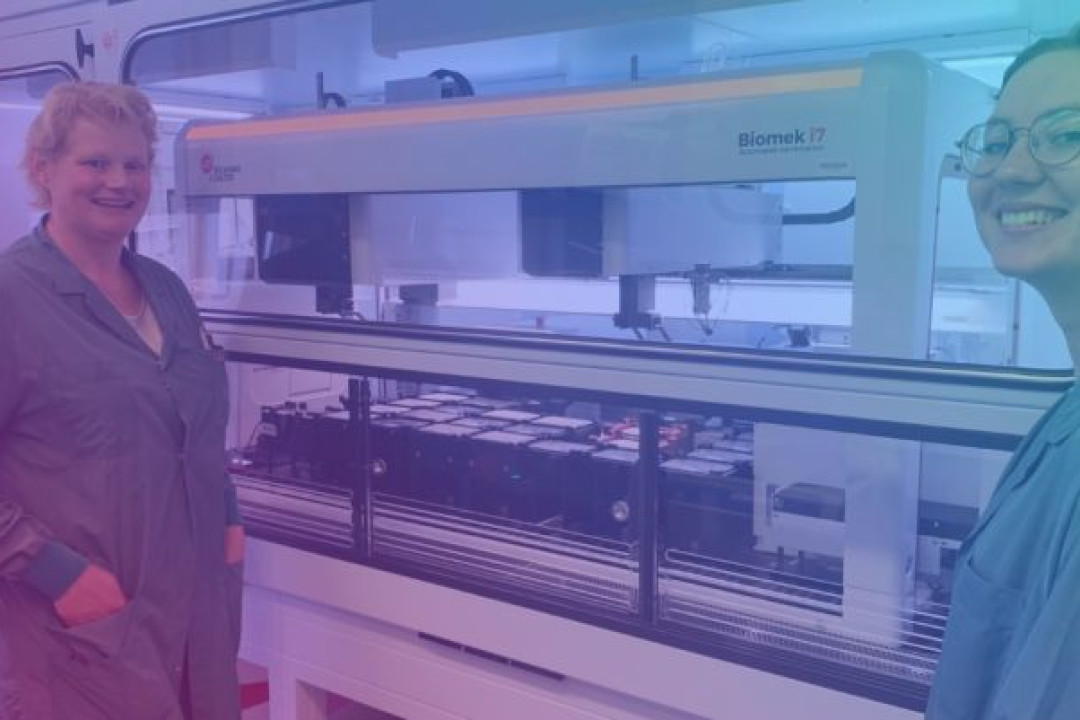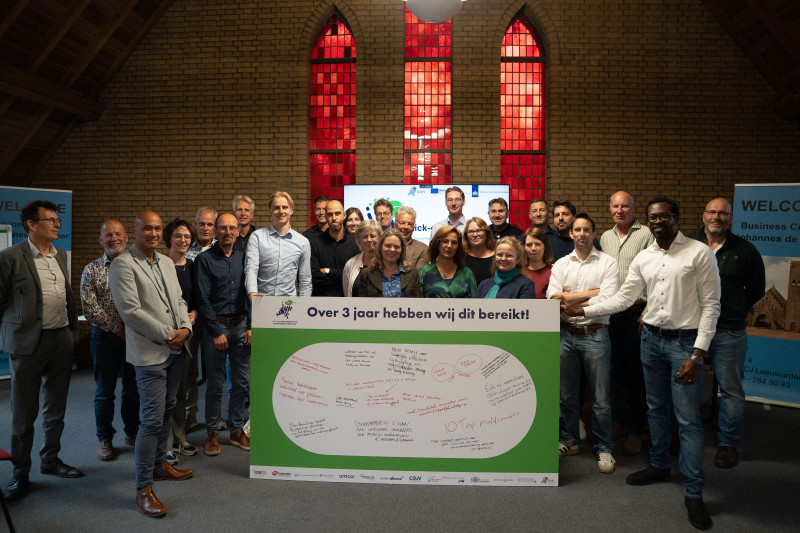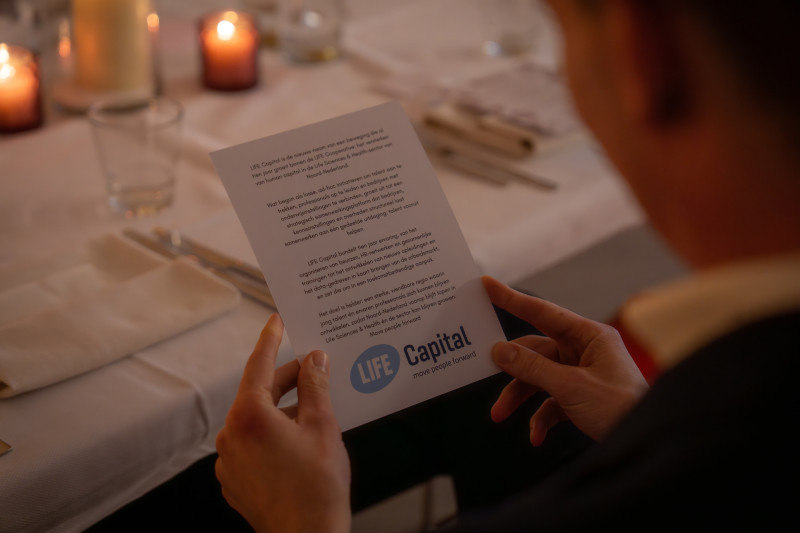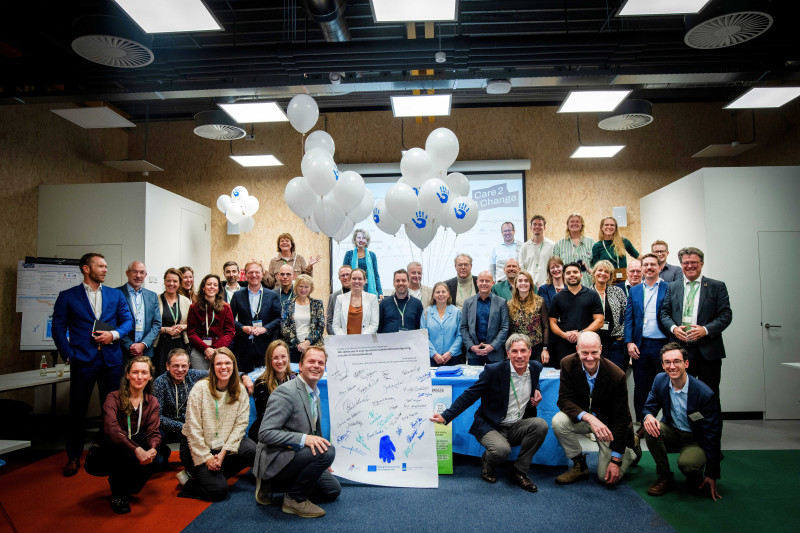The G2Solutions project, led by Prof. Dr. Ir. Floris Foijer from the UMCG – ERIBA Research Institute, has received funding from PharmaNL under the PharmaNL Shared Development Infrastructure program for their five-year project. G2Solutions focuses on developing infrastructure for new drug development. “This project demonstrates that we can make unique technologies, such as single-cell sequencing and stem cell and organoid production, available to the world, creating new opportunities for drug development,” says Peter Ketelaar, director of LIFE Cooperative. The project involves close collaboration between UMCG/ERIBA, UMCG/Genetics, LIFE Cooperative, GenomeScan, and Pivot Park Screening Centre.
G2Solutions utilizes groundbreaking technologies, including single-cell genomics. This technology, in which UMCG is a global leader, allows for the analysis of the genome of individual cells. This is crucial for chronic and complex diseases such as cancer, where the genome of cancer cells often shows significant variations. Instead of obtaining an average picture from millions of cells in a tissue, single-cell sequencing provides insights into the genetic abnormalities of individual cells. “The unique aspect of our approach is that we can read the DNA of individual cells, allowing us to examine much more closely what is happening within a tumor,” explains Foijer.

The techniques being developed in the project not only have scientific value but also significant commercial applications. Floris Foijer emphasizes that one of the main goals is to explore whether these technologies can be made widely accessible and affordable for diagnostics and therapies. Peter Ketelaar adds: “The biggest challenge for the business side is to find the right product-market combinations that can lead to sustainable success. We need to make technologies that are currently working in the lab affordable and applicable for a broader and international market.”
The project aims to make this infrastructure available to other pharmaceutical and academic partners, both nationally and internationally. Pivot Park Screening Centre, GenomeScan, and LIFE Cooperative are involved in further developing and marketing these technologies. Brigitte Drees from Pivot Park Screening Centre: “In this project, we are using our expertise to accelerate and optimize the development of new technologies. With our extensive experience in high-content screening and bioprofiling services, we contribute to identifying promising leads for drug development, which is crucial for the success of this innovative project.”
Kees van den Berg, CEO of GenomeScan explains: “At GenomeScan, we have extensive knowledge and experience in developing existing sequencing technologies from academia into a commercial facility for pharmaceutical and biotech companies. We will also apply this expertise to this innovative project.”
Ultimately, the goal is to establish a commercial company that will continuously offer the acquired knowledge and improved techniques. Foijer: “It’s an exciting journey to see whether we can bring academic technology to the market within five years. This project brings together science, technology, and entrepreneurship – a unique opportunity to achieve groundbreaking innovations.”
Floris Foijer and Peter Ketelaar also share some tips for future grant applicants at PharmaNL. Peter emphasizes that a successful grant application requires both strong technology and experienced entrepreneurs with market knowledge. “The core technology must be solid and fairly unique,” he says. “Additionally, you need to involve people who know how to bring new products and technologies to market. Understand the landscape of the subsidy world and the requirements, such as those of the funding provider.”
Floris adds that intrinsic motivation for collaboration and openness is crucial. “You need to have the desire to make your resources available, not just to secure funding for your own organization,” he explains. “Creating truly open infrastructure requires a willingness to share and collaborate.”
The development of this project has been made possible with the support of the Municipality of Groningen and the Municipality of Assen, the Province of Groningen, Drenthe, and Fryslân.
Source text: PharmaNL
Photo: Mathilde Broekhuis and Laura Kempe (two professionals at ERIBA) at the robot, photographer Floris Foijer.

A unique collaboration for an urgent problem Pharmaceutical residues in groundwater and surface water pose a growing problem. Due to population ageing and the rise in chronic conditions, medication use is expected to increase significantly in the coming years. This creates an increasing threat to environmental and human health, particularly in Northern Netherlands as one of the most rapidly ageing regions. What makes this project unique is that parties from the water technology sector, the Life Science & Health sector, and the healthcare sector jointly work with SMEs to develop innovative solutions. Under the leadership of lead partner TCNN, these domains are brought together, resulting in a powerful acceleration of both knowledge development and the actual implementation of innovative solutions.Project objectives Under the guidance of work package leaders Water Alliance, LIFE Cooperative, CEW, and UMCG, the partners focus on elaborating existing problem areas. For each problem area, SMEs will be sought that can provide solutions across four interconnected pillars: • Advanced water treatment: development and application of new technologies to effectively remove pharmaceutical residues from water. • More sustainable medicines and administration: innovation in pharmaceutical products and delivery methods that reduce environmental impact. • Improved prescribing behaviour and medication adherence: awareness-raising and training to prevent unnecessary medication use. • Active knowledge sharing: intensive collaboration, communication, and dissemination of best practices within the region and beyond.Impact after three years During the kick-off, participants emphasised the shared ambitions they aim to achieve: • A structural connection between the water, pharmaceutical, and healthcare sectors• Measurable reduction in medication use through more conscious prescribing• Sustainability as an integral and self-evident part of medication use and policy In addition to these societal benefits, the project aims to create 75 new jobs and to provide targeted support to at least 30 companies. The developed solutions can also be applied nationally and internationally. This integrated approach positions Northern Netherlands as a national and international frontrunner in tackling pharmaceutical residues in water.Partners The project is a collaboration between: TCNN (lead partner), LIFE Cooperative, Wilhelmina Ziekenhuis Assen, Martini Ziekenhuis, Isala Ziekenhuis, University of Groningen, UMCG, Frisius MC, Water Alliance, Centre of Expertise Watertechnology (CEW), Wetterskip Fryslân, Waterschap Noorderzijlvest, Province of Groningen, Province of Drenthe, Province of Fryslân, SNN, and Medicijnresten uit Water Noord-Nederland. Together, we are building a healthy, sustainable, and economically strong Northern Netherlands.

With the launch of LIFE Capital, the Northern Netherlands gains a powerful collaboration platform that brings together companies, talent, and knowledge institutions in the fast-growing Life Sciences & Health sector. During a special launch dinner on Tuesday, November 25 at LIFE Cooperative member Polyvation on the Groningen Campus, not only was the new brand unveiled, but an ambitious vision for the future was also presented. LIFE Capital, formerly LIFE Academy, marks the next phase of the LIFE Cooperative: shifting from a focus on training alone to a broadly supported collaboration platform for human capital. “With LIFE Capital we are taking the next step in strengthening our sector,” says Melloney Dröge, board member of the LIFE Cooperative. “We are bringing companies, talent, and knowledge together into one ecosystem where growth, learning, and innovation go hand in hand. We are aiming for a joint approach to the human capital challenges of our sector. In this way, we are building a region where you can truly move forward for a lifetime, literally and figuratively.”From LIFE Academy to LIFE Capital The transition from LIFE Academy to LIFE Capital is more than a name change. The new brand reflects the organization’s growth and its ambition to look beyond training alone. LIFE Capital will become the linchpin of human capital in the Life Sciences & Health sector: it connects talent, companies, and knowledge, accelerates collaboration, and strengthens the position of the Northern Netherlands as a breeding ground for innovation and talent. A long and healthy life: that is ultimately what Life Sciences & Health is all about. Thanks to innovations from companies in this sector, diseases are detected sooner, treated more effectively, and sometimes even prevented. From breakthrough therapies to keeping healthcare affordable and accessible, the business community acts as the engine behind life-changing progress. LIFE Capital aims to strengthen that foundation by investing in people, knowledge, and collaboration. “LIFE Capital helps companies move forward, but also strengthens the image and visibility of our sector,” says Sven Stielstra, Manager of LIFE Capital. “In this way, we show what Life Sciences & Health truly stands for and make the sector attractive to new talent and innovative companies. Over the next ten years, we will attract €50 million for human capital. In this first year alone, we have already realized €6.6 million through regional and national funds.”Looking ahead: recruitment campaign and pilots in 2026 Today, the day after the launch dinner, LIFE Capital’s recruitment campaign begins. This campaign focuses on attracting participants for the first pilot modules, which will start in spring 2026. These modules were developed thanks to an intensive and unique collaboration between Hanze, UMCG, and various companies within the sector. By combining knowledge and practical experience, top-notch programmes have been created that will be tested in the coming period. After the pilot phase, the modules will be further developed and made more widely available later in 2026 to everyone in the Northern Netherlands who wishes to contribute to a strong Life Sciences & Health ecosystem.About LIFE Capital LIFE Capital is the collaboration platform of the LIFE Cooperative, a network of more than 60 companies in the Life Sciences & Health sector. The platform connects organisations around shared human capital challenges and develops solutions that attract, develop, and retain talent. What started ten years ago as separate initiatives within the cooperative has grown into a strategic programme in which companies, knowledge institutions, and governments work together on a structural basis. With activities ranging from joint training and HR networks to new educational programmes and labour market research, LIFE Capital works towards one goal: a strong, agile region in which talent in life sciences & health can continue to grow with the right skills. Move people forward.About LIFE Cooperative The LIFE Cooperative stimulates innovation in the life sciences by facilitating collaboration between entrepreneurs, researchers, and investors. Through various programmes and events, LIFE promotes the development of technologies that improve health and well-being. The cooperative represents more than 60 companies in the Northern Netherlands, ranging from ambitious startups and innovative SMEs to international players. Together, they represent approximately 5,000 FTEs and a turnover of €500 million.

Accelerating Sustainability in Healthcare Paulina Snijders, member of the UMCG Executive Board, and Bart Volkers, director of the Circular Groningen Drenthe Association (VCGD), opened the executive network meeting. They emphasized the importance of cooperation between all partners. Artist Maria Koijck delivered an inspiring keynote on visualizing hospital waste. UMCG Chief Green Officer Schelto Kruijff outlined opportunities to accelerate sustainability in healthcare, sharing inspiring examples such as the use of a washable, reusable insulation gown. Project leaders Sven Jurgens and Femke van der Zant described how the consortium has significantly developed in recent times.Various Work Packages The executives exchanged extensive experience and knowledge, and the Care2Change work package leaders presented posters. The work packages focus on areas such as redesigning single-use healthcare products and mapping the CO₂ emissions of products. Sven Jurgens said: “Care2Change is the starting point for continued collaboration on making healthcare more sustainable. How valuable it would be if, through this collaboration, we could provide a blueprint for others to inspire them to go green as well.”Northern Netherlands as an Example Hanneke Bouwsema, secretary to the special government representative for the circular economy at the Ministry of Infrastructure and Water Management, emphasized the importance of starting small and recognizing the sustainable initiatives that are already working well. She described the Northern Netherlands as a “role model” for The Hague when it comes to making healthcare more sustainable.About the Care2Change Consortium Care2Change is a collaboration between UMCG, University of Groningen, Martini Hospital, Sterinoord, GS1/EAN Netherlands, Boikon, Ommelander Hospital, Treant, Frisius MC, NHL Stenden, Hanze University of Applied Sciences, Circular Friesland Association, LIFE Cooperative, Circular Groningen Drenthe Association, Green Chemistry Drenthe Business Network (SUSPACC), Milieuplatform Zorg, Nij Smellinghe, Pezy Product Design, 8D Games, House of Design, Antonius Hospital, NOM, Menzis, De Friesland, Ecoras, BBENG, the provinces of Groningen and Drenthe, and the municipalities of Groningen, Assen, Leeuwarden and Emmen. The project is partly funded by SNN’s ERDF resources, with co-financing from the participating organizations.More Information Want to know more about Care2Change and the consortium? Read: UMCG trots op nieuwe samenwerking die uitstoot terugdringt: Care2change Source article: Care2Change